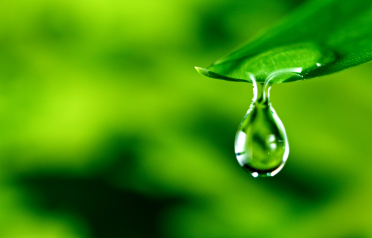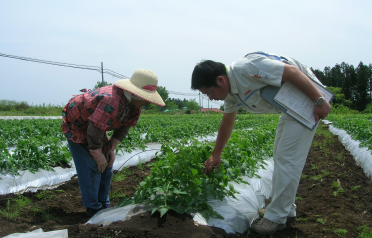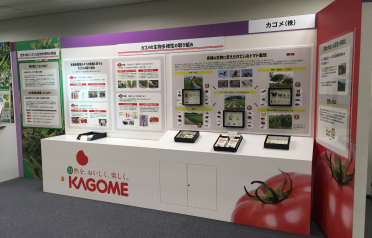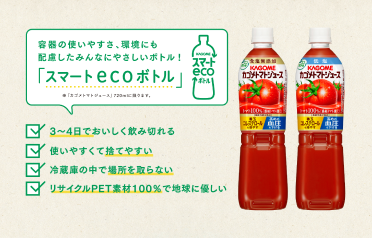



持続可能な農業
カゴメは創業以来、農業によってもたらされる「自然の恵み」を活かして事業を行ってきました。農業は、私たちに自然の恵みである農産物を与えてくれると同時に、農村に多様な環境を生み出し、多くの動植物が暮らす場を作り出しています。農業が生み出す農村や里山の自然は、社会の人々に住みよい環境や精神的文化といった幅広い恵みをもたらしてくれます。すなわち農村の「生物多様性」は、人々の健康で幸せな生活を支える大切な存在であるといえます。
しかし20世紀以降、急激に拡大した人間活動による負荷は、地球が許容できる範囲を超え、世界各地で陸上や海の生物多様性とそこから得られる自然の恵みを大きく減少させてきました。一方、未来の日本では、農業従事者の減少や耕作放棄地の増加が更に進み、農業の営みが生み出す多様な環境が失われようとしています。
カゴメグループ生物多様性方針
このような背景を踏まえ、カゴメは生物多様性と事業との関係についての現状評価を行い、事業における様々な場面で生物多様性の向上に努め、自然の恵みを活かした企業活動が将来にわたり持続的に成長できるよう、品質・環境方針(※1)に基づき、「カゴメグループ生物多様性方針」を定めました。 この方針はサプライチェーン全体に関わるものですが、持続可能な農業への取り組みも方針に則って推進しています。
カゴメグループは、この方針に則り、生物多様性の保全と回復に努め、ネイチャーポジティブに向けた世界の目標(※2)に貢献していきます。
※1 品質・環境方針(第3項)「野菜を育む水・土・大気を守り、豊かな自然環境をつくる農業を未来へつなぎ、得られた恵みを有効に活用します。」
※2 生物多様性条約第15回締約国会議(COP15)で採択された昆明・モントリオール生物多様性枠組。2030年までに生物多様性を回復軌道に乗せ、2050年までに自然と共生する社会の実現を目指す。
| サプライチェーンでの保全 | 社内外パートナーとの協働 |
| 1.遺伝資源の維持と利用 | 8.社内外への浸透 |
| 2.農業の環境負荷低減 | 9.社外との対話 |
| 3.農地と周辺の生態系保全 | 10.情報公開 |
| 4.調達品の環境負荷低減 | 11.社会貢献 |
| 5.輸送時の配慮 | 12.根本原因への対応 |
| 6.工場の環境負荷低減 | |
| 7.製品・サービスへの配慮 |
目標
| 区分 | 課題 | 2025年のKPI | |
| 4.持続可能な農業 | 1)国内外の持続可能な農業の推進 | スマートアグリ事業の推進 |
収量増大、灌漑量低減などの実現 (Low input/high output農業の実現) |
|---|---|---|---|
| 2)持続可能な原材料調達の推進(FSC、RSPOなど) | FSC認証マークの紙容器への表示 | 対象全商品に表示 | |
| 3)野菜栽培での生物多様性保全 | 生物多様性保全型土着天敵活用技術の開発(生きものと共生する農場) | 生きものと共生する農場、及び一部の農家で検証した技術をまとめたガイドブック作成 | |
国内外の持続可能な農業の推進
国内加工用トマトの栽培における取り組み
面積契約による生トマト調達
トマトジュースなどに使用する国産の加工用トマトは、調達を開始する前に、品質規格を含む契約を取引先と結びます。そのうち「面積契約」による調達方式の場合、面積や価格等を確定した上で栽培を依頼し、収穫されたトマトは規格に適合する全量を買いとります。
カゴメから種子や苗を提供し、栽培方法を指導し、安定した収量を確保することで農家の皆さんがトマト栽培を通じて、経営の安定化を図ることができます。農地の生物多様性は、農地が維持・管理されて成り立ちます。トマト栽培を続けることで、耕作放棄地の抑制、生態系豊かな農地の維持に努めています。

農薬と肥料の使用方法へのこだわり
カゴメは安心・安全・環境に配慮した栽培思想の下、畑の土づくりや、過剰な化学農薬、化学肥料を使用しない栽培について、面積契約を結ぶ産地への指導を行っています。
<農薬の使用方法>
栽培上必要な農薬は使用しますが、生態系を崩さないためのカゴメのこだわりがあります。
●トマトに使用可能な農薬から、生産性と消費者・生産者、環境に配慮した「カゴメ使用農薬指針」を設定し推奨
●カゴメの一斉分析法で分析可能な農薬の優先的な使用
●現地担当者が畑を巡回する際、病虫害発生状況を確認し、迅速に診断を行い、適切な農薬の使用を指導することで、農薬の使用を最小限に抑制
●毎年発生した病虫害の状況を総括し、病虫害の予防に力点を置くことで、農薬使用量を低減
●トマト栽培を組み入れた輪作体系により土壌中の微生物相を多様にし、連作障害や病虫害の発生を抑制
●農薬散布履歴と残留農薬分析で、「カゴメ使用農薬指針」が守られていることを確認
<肥料の使用方法>
●有機質肥料である堆肥・緑肥を積極的に使用し、化学肥料使用量を抑制する土づくりを推奨
●作付け予定の畑の土壌を必要に応じて事前にカゴメが分析し、畑の状態に合わせた施肥設計を指導、その後、トマトの葉や果実を用いた生育診断で、トマトの生育に最適な肥料の使用量を決定することで、土壌への過剰な肥料の使用を抑制
加工用トマト生産者の高齢化対策
国産加工用トマトの調達における大きな課題は生産者の高齢化です。30~40年にわたって栽培し続けている生産者が多く、後継者不足を理由に栽培をやめていくケースもあります。その1番の原因は収穫時期が7月下旬から8月中旬の最も暑い時期に集中することで、手作業によるトマトの収穫が過重な負担となっています。カゴメは農業機械メーカーと共同で加工用トマト収穫機「Kagome Tomato Harvester」(以下、KTH)を開発しました。KTHの作業効率は人手による作業の約3倍に達し、1人1日あたり1.8トンの収穫が可能となります。2017年にはトマトの運送委託業者に収穫機の運転、運搬などの作業を委託してKTHと作業者をセットで派遣する取り組みを茨城県でテスト導入し、現在も継続・拡大しています。

野菜の遺伝資源の維持と活用
総合研究所では、民間企業では世界有数の約7,500種類のトマト遺伝資源を保管・維持しています。いろいろな遺伝的特徴を持ったトマトの種子を収集し、交配を重ねて新たな有用品種を生み出しています。収集した遺伝資源の保有形質を再評価し、病害虫抵抗性品種(農薬使用量が低減)の開発等にも活用しています。また、米国や欧州などに拠点をもつUnited Genetics Holdings LLC.では、トマトをはじめとする野菜の自社品種を開発し、世界80カ国以上に種子や苗を提供しています。

地球温暖化への適応
耐病性品種の開発
United Genetics Holdings LLC.では、ブリーダーと呼ばれる開発者が、遺伝子組み換えではない従来の交配技術により長い年月をかけて品種改良を行い、各国の栽培環境やマーケットニーズに適した品種ができるまでトライアルを繰り返しています。
近年、日本を含め世界各国では、地球温暖化の影響からタバココナジラミの生息範囲が拡大し、この害虫が媒介するウイルス(TYLCV)によって、トマト生産に壊滅的な被害を与えるトマト黄化葉巻病が蔓延しています。これに対し、United Genetics Holdings LLC.では、このウイルスに耐性をもつトマト品種を積極的に開発し、被害が拡大する地域に導入を進めています。このことは病害リスクを回避するとともに、農薬使用量の低減にもつながっています。
少量多頻度灌漑に対応した AI営農アドバイスと自動灌漑制御の開発
昨今、温暖化による気候変動などの影響により、農業生産者には大変厳しい環境が続いています。特に、ここ数年世界各地で発生している干ばつは農作物の栽培に大きな打撃を与えており、持続可能な農業を実現していく上で、水不足への対策は喫緊の課題となっています。
従来、最適な土壌水分量を保ち消費する水の量を削減する栽培手法として少量多頻度灌漑(※1)が一般的に知られていますが、刻々と変化する最適な水分量を判断するのが難しく、また、広大かつ複数の圃場をもつ生産者にとっては管理が複雑で作業負荷が大きいことから普及が進んでいません。
カゴメと日本電気株式会社(NEC)が設立した合弁会社「DXAS Agricultural Technology」では、2023年4月より、少量多頻度灌漑に対応したAI営農アドバイスと、作業負荷の軽減につながる自動灌漑制御機能を加えたサービスを開始し、加工用トマト市場に普及させていくことで、持続可能な農業に貢献してまいります。
(※1)作物が必要とする量の水や肥料を多数回に分けて少しずつ与え、作物にとって最適な土壌水分量を保つ栽培手法のこと。
(※2)灌漑設備と連携し、水や肥料をリモート・自動で制御する機能


持続可能な原材料調達の推進(FSC、RSPOなど)
紙容器飲料へのFSCR認証紙パックの採用
FSCR(Forest Stewardship CouncilR:森林管理協議会)は、木材を生産する森林と、その森林から切り出された木材の流通や加工の過程を認証する制度を管理する国際的な機関です。
FSCマークが入った製品を選択して購入いただくことで、海外で生産された木材であっても、環境や社会に大きな負荷をかけずに生産された製品(木材)を選択できるような仕組みになっており、世界の森林保全を間接的に応援できます。
カゴメは2014年9月からFSCマークのついた紙パック飲料を導入し、2020年現在、200ml・330ml紙パック飲料の全てにFSCマークを表示しています。
今後もFSC認証紙パックの使用を継続し、持続可能な資源を用いたものづくり・商品の提供によって、サステナブルな社会の実現へ貢献していきます。


パーム油のRSPO認証の取得
パーム油は生産性が高く年間を通じて収穫でき安価なことから生産量は年々増加していますが、生産地では急激な生産拡大にともない、新規農園開発のための熱帯雨林の伐採やそれにともなう野生生物の生息地の縮小などの問題が生じています。また不適切な農園経営による、健康や安全への配慮が乏しい劣悪な労働環境や、低賃金、移民労働者の不当な扱い、児童労働など、社会的公正を欠くさまざまな労使問題も指摘されています。
カゴメは、このような問題の解決に向けた「持続可能なパーム油のための円卓会議(RSPO)」に賛同し、正会員として加盟し、2019年にカゴグループの米国工場であるKagome Inc.でMB認証を、2020年にはカゴメでB&C認証を取得しました。2023年度のRSPO認証油比率は37%となりました(米国のMB認証36%、日本のB&C認証100%)。カゴメグループは今後も持続的な原料調達を目指していきます。
※RSPO(Roundtable on Sustainable Palm Oil)
世界自然保護基金(WWF)、欧米企業、マレーシアパーム油協会などにより2004年に設立された国際組織で、持続可能なパーム油生産のための8つの原則と39の基準に基づき、持続可能なパーム油を認証しています。
野菜栽培での生物多様性保全
畑と周辺の生物多様性調査
カゴメグループは、畑及び周辺の生物多様性を保全しながら適切に管理していくことが、事業を通じて持続的に生き物や環境を守るために重要だと考えています。
2018年7月及び2019年7月に、茨城県の露地栽培のトマト畑にて、トマト畑と周辺の生物多様性の調査を行いました。その結果、トマト畑と周辺半径100mの場所には、「150種前後もの昆虫が存在すること」、「草地の植物種が多様なほど昆虫や鳥の種類が多くなること」、「畝間に敷きワラを施しているトマト畑では、地を這うコウチュウ目(益虫)が種類も数も増加し、トマト害虫を駆除してくれる昆虫を増やすことができる可能性があること」などがわかりました。この畑と周辺の生物多様性調査は、2020年からはカゴメ野菜生活ファーム富士見(長野県諏訪郡富士見町)に場所を移し継続しています。

「生きものと共生する農場」の設置と公開
持続的な農業を具現化するため、カゴメ野菜生活ファーム富士見に隣接する 1.2ヘクタールの畑に「生きものと共生する農場」を設置し2020年7月から公開しました。この農場は、様々な生きものが畑の周りで生活しやすい環境にする仕掛けや、害虫の天敵など、農業に役立つ生きものを畑に呼び込み、生きものの力を活かした農業を行う仕掛けを設置しています。
また、この農場のしくみを知っていただいたり、生きものに親しみ生きものを大切にする気持ちを醸成するため、クイズラリーで楽しみながら学んでいただく工夫をしています。
生物多様性のリスク評価と対応
日本の農地は圃場整備により、畦畔の草地に生える在来植物が除去され減少し、外来植物が増加しており、野菜生活ファームも同様であることから、この施設が存在する富士見町内の在来植物を探索し種子を採取し、播種・育苗し、2021年と2022年に野菜生活ファームの法面等に約1万本の苗を植栽し、定着状況をモニタリングすることで地域の在来植物の再生を図っています。
更に在来植物の植栽による昆虫種の増加について専門家による調査を行い確認しています。

- 写真(左上)⑥石づみハウス
写真(右上)②竹筒マンション
温室トマトで外来種のハチを使用しない受粉
カゴメは1998年、生鮮トマトの生産・販売事業を開始しました。
生鮮トマトは温室を使用して栽培していますが、温室では風がないため、調達先の多くの大型温室ではトマトの受粉にハチを使用します。ハチが受粉を助けるのは、エサとなる花粉を集めるときに花を揺らすためです。
外来種のセイヨウオオマルハナバチが、在来種のハチに悪影響を及ぼす可能性のある特定外来生物の候補に挙がっていることを知り、カゴメが直接管理する大型温室では、2004年5月から在来種のクロマルハナバチに切り替えました。
当初このハチの繁殖技術はまだ確立しておらず、トマトの品質や経済性への影響も不透明でしたが、カゴメが開発を後押しし実現し、今では日本の生鮮トマト栽培の全量をクロマルハナバチで賄えるまでに技術確立されています。










